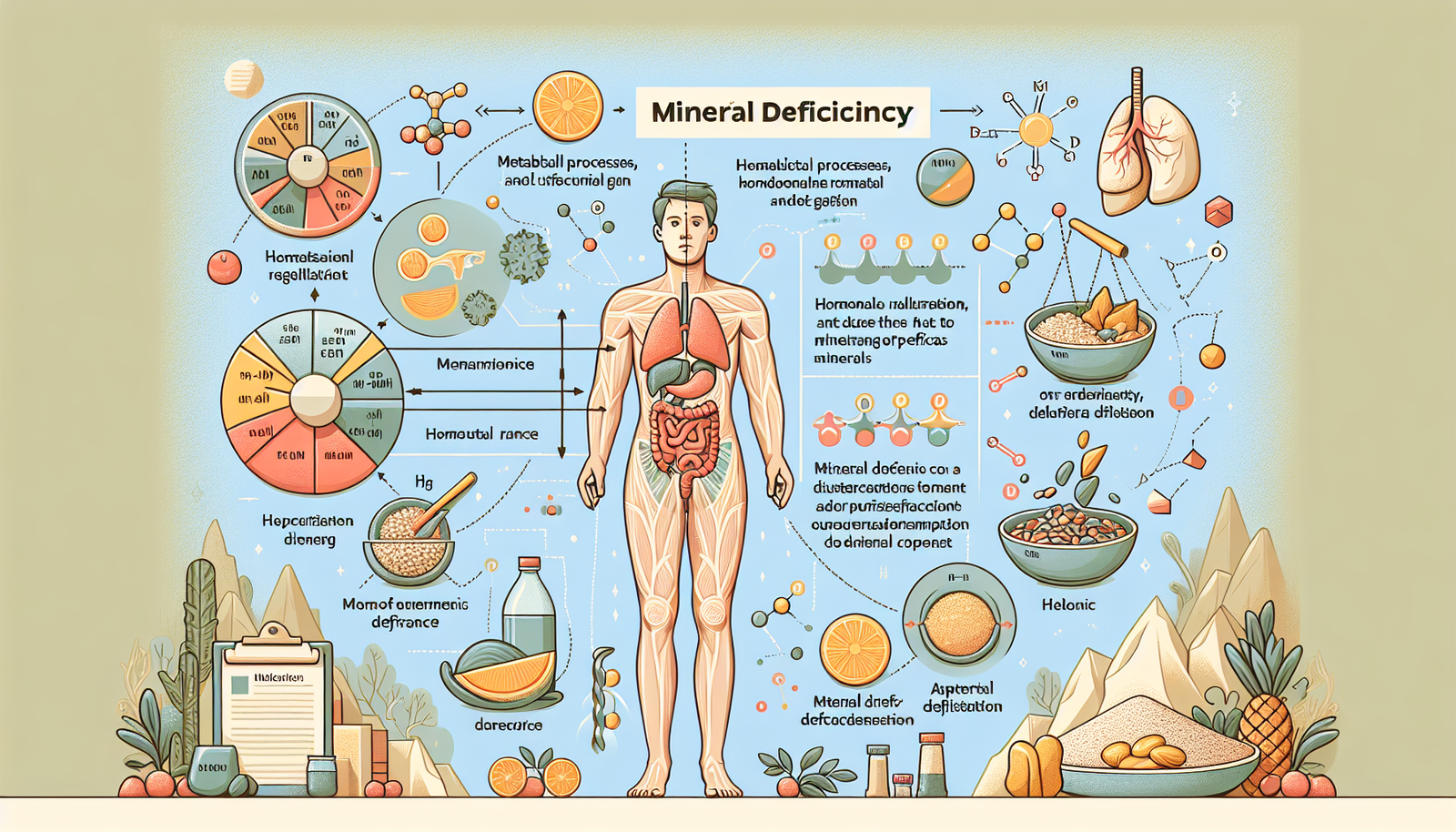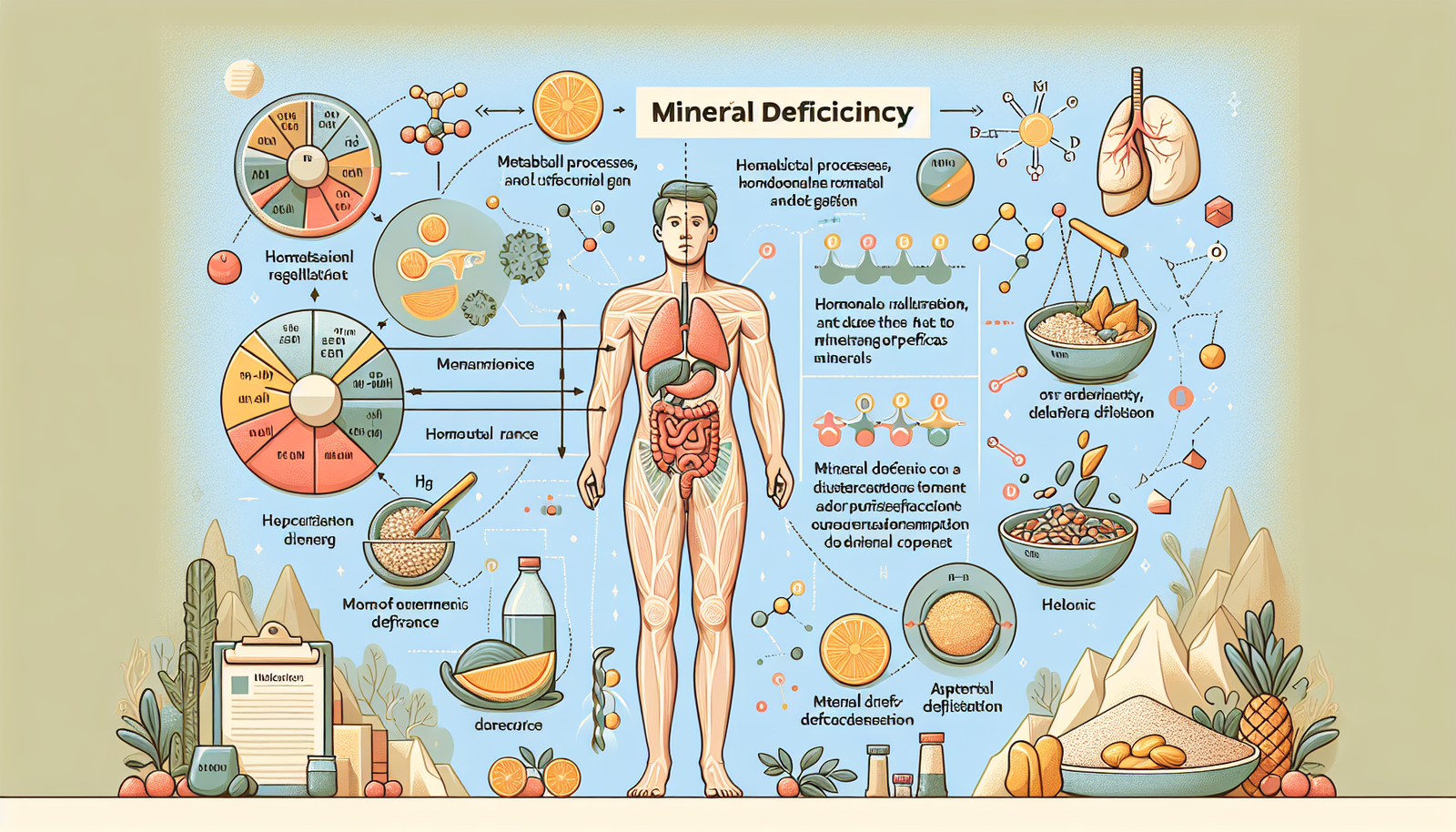Have you ever wondered why despite your efforts to eat healthy and exercise, you still find yourself struggling to lose weight? Well, the answer might lie in a surprising factor – mineral deficiency. Yes, you heard it right! There is a direct link between certain mineral deficiencies and weight gain. This article will unveil the specific mineral that could be sabotaging your weight loss goals, shedding light on why it’s crucial to ensure you’re getting enough of it in your diet. So, if you’ve been frustrated with those stubborn pounds, sit back, relax, and let’s explore how a simple mineral deficiency could be the culprit behind your weight gain.

Calcium
Function and Importance
Calcium is a vital mineral that plays a crucial role in maintaining overall health and wellbeing. It is well known for its essential role in building and maintaining strong bones and teeth. Calcium also supports proper muscle function, nerve transmission, and blood clotting. Furthermore, it is involved in various enzymatic reactions and helps regulate hormone secretion. Without adequate calcium, your body may struggle to perform these vital functions optimally.
Role in Weight Management
Calcium also plays a significant role in weight management. Research suggests that calcium can help regulate body weight by influencing fat metabolism and reducing fat absorption. Studies have shown that a diet rich in calcium leads to increased fat excretion through feces, thus preventing fat accumulation in the body. Additionally, calcium-rich foods are often low in calories, making them a healthy choice for those watching their weight.
Deficiency Symptoms
When your body lacks sufficient calcium, several symptoms can arise. Common signs of calcium deficiency include muscle cramps, numbness or tingling in the fingers and toes, brittle nails, and an increased risk of osteoporosis. In severe cases, a deficiency can lead to osteopenia, a condition characterized by reduced bone density and an increased risk of fractures.
Food Sources
Getting enough calcium is essential, and fortunately, there is a wide variety of foods that are excellent sources of this mineral. Dairy products such as milk, cheese, and yogurt are well-known for their high calcium content. For those who are lactose intolerant or follow a vegan diet, other sources include green leafy vegetables like broccoli, kale, and spinach, as well as calcium-fortified plant-based milk alternatives.
Recommended Daily Intake
The recommended daily intake of calcium varies depending on age and gender. For adults aged 19-50, the recommended amount is around 1000 mg per day. However, women over 50 and men over 70 should aim for 1200 mg per day to support optimal bone health. It’s essential to note that your body’s ability to absorb calcium decreases with age, so it’s crucial to meet these recommendations through a combination of dietary sources and, if necessary, supplementation.
Supplementation
In certain cases, dietary sources alone may not be sufficient to meet your calcium needs. If you are unable to consume enough calcium-rich foods or have specific dietary restrictions, calcium supplementation may be necessary. However, it is important to consult with a healthcare professional before starting any supplement regimen, as they can guide you on the appropriate dosage and ensure it is safe and effective for you.
Iron
Function and Importance
Iron is an essential mineral that plays a vital role in various bodily processes. One of its primary functions is to transport oxygen throughout the body by aiding in the production of red blood cells. Iron also supports the synthesis of DNA, promotes a healthy immune system, and helps convert food into energy. Without enough iron, your body may not be able to carry out these functions effectively.
Role in Weight Management
Iron is not directly linked to weight management, but it indirectly affects it through its role in energy production. Iron contributes to the production of energy from the food you consume, allowing your body to efficiently utilize nutrients and maintain energy levels throughout the day. Adequate iron levels can help prevent fatigue, which can otherwise make it challenging to engage in physical activities and maintain a healthy weight.
Deficiency Symptoms
Iron deficiency, also known as anemia, can result in a range of symptoms. Fatigue and weakness are common signs, as iron deficiency affects your body’s ability to deliver oxygen to tissues and organs. Other symptoms may include pale skin, shortness of breath, dizziness, and hair loss. Pica, a condition where individuals have a craving for non-food substances such as ice or dirt, can also be a symptom of iron deficiency.
Food Sources
There are two types of dietary iron: heme iron and non-heme iron. Heme iron, found in animal-based foods, is generally more easily absorbed by the body. Good sources of heme iron include red meat, poultry, and seafood. Non-heme iron, found in plant-based foods, is less readily absorbed. To enhance its absorption, it is recommended to consume non-heme iron-rich foods alongside sources of vitamin C, such as citrus fruits, tomatoes, or bell peppers. Plant-based sources of iron include beans and legumes, leafy green vegetables, fortified cereals, and tofu.
Recommended Daily Intake
The recommended daily intake of iron varies depending on age and gender. For adult men and postmenopausal women, the recommended amount is 8 mg per day. However, women of childbearing age need higher amounts (18 mg per day) to account for menstrual blood loss and the increased iron needs during pregnancy. It’s important to note that iron requirements may differ for individuals with certain medical conditions or those who follow restrictive diets, so it’s best to consult a healthcare professional to determine your specific needs.
Supplementation
Iron supplementation may be necessary in cases of diagnosed iron deficiency anemia or when dietary intake alone is insufficient to meet your iron needs. However, iron supplements should be taken under the guidance of a healthcare professional, as excessive iron intake can be harmful. They can determine the appropriate dosage based on your individual needs and monitor your iron levels to ensure optimal supplementation.
Magnesium
Function and Importance
Magnesium is a vital mineral that is involved in over 300 biochemical reactions in the body. It plays a crucial role in supporting muscle and nerve function, maintaining a steady heartbeat, and promoting a healthy immune system. Magnesium is also necessary for maintaining strong bones and regulating blood sugar levels. It acts as a cofactor in several enzymatic reactions and is essential for energy production, DNA synthesis, and protein synthesis.
Role in Weight Management
Magnesium indirectly influences weight management through its involvement in various metabolic processes. It plays a role in carbohydrate metabolism and insulin function, which are both important for regulating blood sugar levels and preventing insulin resistance. Magnesium also helps maintain healthy muscle mass, which is important for overall body composition. Additionally, studies have suggested that magnesium deficiency may be linked to a higher risk of obesity and metabolic syndrome.
Deficiency Symptoms
Symptoms of magnesium deficiency can vary and may include muscle cramps and spasms, fatigue, weakness, and irregular heart rhythms. Other signs may include poor appetite, nausea, and vomiting. Chronic magnesium deficiency can lead to more severe symptoms such as numbness and tingling, seizures, and personality changes. However, it’s important to note that magnesium deficiency is relatively rare in individuals with a well-balanced diet.
Food Sources
A variety of foods can provide you with an adequate amount of magnesium. Good dietary sources of magnesium include nuts and seeds, legumes, whole grains, leafy green vegetables, fish, and avocado. Incorporating these foods into your diet can help ensure sufficient magnesium intake.
Recommended Daily Intake
The recommended daily intake of magnesium varies by age and gender. For adult men, the recommended amount is around 400-420 mg, while adult women should aim for 310-320 mg per day. Pregnant and lactating women have slightly higher requirements. It’s important to note that individual needs may vary based on factors such as physical activity levels, certain medical conditions, or the use of certain medications.
Supplementation
In general, magnesium supplementation is not necessary for individuals with a well-balanced diet. However, certain individuals, such as those with certain medical conditions or those at risk for magnesium deficiency, may benefit from supplementation. If you believe you may have a magnesium deficiency or are considering magnesium supplements, it’s important to discuss this with a healthcare professional who can assess your specific needs and recommend an appropriate course of action.
Zinc
Function and Importance
Zinc is an essential mineral required for numerous bodily functions. It plays a crucial role in supporting the immune system and promoting wound healing. Zinc is also involved in DNA synthesis, cell division, and the production of proteins and enzymes. It supports healthy growth and development and contributes to normal taste and smell sensations. Zinc is also vital for reproductive health and proper hormone regulation.
Role in Weight Management
While zinc is not directly linked to weight management, it indirectly affects it through its involvement in various metabolic processes. Zinc is required for the synthesis and metabolism of carbohydrates, proteins, and fats. It helps regulate appetite and satiety, thus influencing energy intake and expenditure. Zinc deficiency may lead to alterations in taste and smell, which can affect food preferences and appetite regulation.
Deficiency Symptoms
Zinc deficiency can manifest in several ways. Common symptoms include frequent infections, delayed wound healing, loss of appetite, and hair loss. Additionally, individuals with zinc deficiency may experience gastrointestinal disturbances such as diarrhea or impaired taste and smell sensations. Children with severe zinc deficiency may also experience growth retardation and delayed sexual maturation.
Food Sources
A diverse and balanced diet can provide sufficient amounts of zinc. Good dietary sources of zinc include red meat, poultry, shellfish, nuts and seeds, legumes, whole grains, and dairy products. It’s important to note that the bioavailability of zinc from plant-based sources is generally lower, so individuals following a vegan or vegetarian diet may need to ensure adequate intake through a combination of plant-based sources or consider supplementation if necessary.
Recommended Daily Intake
The recommended daily intake of zinc varies depending on age and gender. Adult men generally require around 11 mg per day, while adult women need around 8 mg per day. Pregnant and lactating women have slightly higher requirements. It’s important to note that excessive zinc intake can be harmful, so it’s best to consult a healthcare professional to determine your specific needs and ensure safe and adequate intake.
Supplementation
Zinc supplementation is generally not necessary for individuals with a well-balanced diet and no underlying deficiencies. However, certain populations, such as individuals with certain medical conditions or those at risk for zinc deficiency, may benefit from supplementation. If you are considering zinc supplements, it is important to consult with a healthcare professional who can assess your specific needs and provide guidance on the appropriate dosage and duration of supplementation.

Selenium
Function and Importance
Selenium is a trace mineral that acts as a powerful antioxidant in the body. It plays a critical role in protecting cells from damage caused by harmful free radicals. Selenium is also necessary for the proper functioning of the thyroid gland, which plays a crucial role in metabolism regulation. Additionally, selenium supports a healthy immune system and contributes to DNA synthesis and repair.
Role in Weight Management
Selenium’s role in weight management is primarily related to its antioxidant properties and its influence on thyroid function. Antioxidants help protect cells from damage, which is crucial for overall health, including maintaining a healthy weight. The thyroid gland regulates metabolism, and adequate selenium levels are necessary for optimal thyroid hormone synthesis and function.
Deficiency Symptoms
Selenium deficiency is rare in individuals with a well-balanced diet, but it can occur in certain regions where the soil is low in selenium. Symptoms of selenium deficiency can include fatigue, muscle weakness, impaired immune function, hair loss, and changes in mood or cognition. Severe deficiency may lead to a condition called Keshan disease, a form of heart disease, or Kashin-Beck disease, a type of joint disorder.
Food Sources
Selenium can be found in a variety of foods. Good dietary sources of selenium include Brazil nuts, seafood (especially tuna and shrimp), organ meats, lean meats, whole grains, and dairy products. Consuming a balanced diet that includes these selenium-rich foods can help ensure you meet your selenium needs.
Recommended Daily Intake
The recommended daily intake of selenium varies depending on age and gender. For adults, the recommended amount is around 55 mcg per day. However, pregnant and lactating women have slightly higher requirements. It’s important to note that excessive selenium intake can be harmful, so it’s best to consult a healthcare professional to determine your specific needs and ensure safe and adequate intake.
Supplementation
In general, selenium supplementation is not necessary for individuals with a well-balanced diet. Excessive selenium intake can be harmful and lead to adverse effects. However, certain individuals, such as those with certain medical conditions or those at risk of selenium deficiency, may benefit from supplementation. As always, it’s important to consult with a healthcare professional before starting any supplement regimen to determine your specific needs and ensure safe supplementation.
Iodine
Function and Importance
Iodine is an essential mineral required for the production of thyroid hormones, which regulate metabolism, growth, and development. These hormones are crucial for brain development in infants and children, making iodine particularly critical during pregnancy and early childhood. Iodine also supports immune function, helps maintain healthy skin, and plays a role in maintaining healthy hair and nails.
Role in Weight Management
Iodine indirectly affects weight management through its role in regulating metabolism. The thyroid hormones produced with the help of iodine play a crucial role in determining your metabolic rate. An optimal metabolic rate is important for maintaining a healthy weight. However, it’s essential to note that iodine deficiency alone is unlikely to cause significant weight gain. Weight management involves multiple factors, including overall diet, physical activity, and lifestyle choices.
Deficiency Symptoms
Iodine deficiency can lead to a condition called hypothyroidism, where the thyroid gland doesn’t produce enough thyroid hormones. Symptoms of hypothyroidism may include fatigue, weight gain, sensitivity to cold, dry skin, hair loss, and cognitive impairments. Severe iodine deficiency during pregnancy can result in developmental issues and intellectual disabilities in the newborn, a condition known as cretinism.
Food Sources
Good dietary sources of iodine include iodized salt, seafood (such as seaweed, cod, and shrimp), dairy products, eggs, and some fruits and vegetables. Consuming these iodine-rich foods can help ensure adequate intake of this essential mineral.
Recommended Daily Intake
The recommended daily intake of iodine varies depending on age and life stage. For adults, the recommended amount is around 150 mcg per day. However, pregnant and lactating women have higher requirements to support the developing fetus and milk production. Your healthcare professional can guide you on the specific iodine intake appropriate for your individual needs.
Supplementation
In regions where iodine deficiency is prevalent or for individuals at risk of deficiency, iodine supplementation or the use of iodized salt may be recommended. It’s important to note that excessive iodine intake can also be harmful, so it’s crucial to consult with a healthcare professional who can assess your specific needs and provide guidance on the appropriate dosage and duration of supplementation.

Chromium
Function and Importance
Chromium is an essential trace mineral that plays a role in glucose metabolism. It enhances the action of insulin, a hormone that helps regulate blood sugar levels. Chromium also supports macronutrient metabolism, including the breakdown and utilization of carbohydrates, proteins, and fats. Furthermore, it aids in the maintenance of normal blood lipid levels and supports cardiovascular health.
Role in Weight Management
Chromium has been suggested to have a role in weight management by potentially enhancing insulin sensitivity and aiding in the regulation of appetite and food cravings. Some studies have shown that chromium supplementation may help control blood sugar levels, reduce food cravings, and improve body composition by promoting the loss of fat while preserving muscle mass. However, more research is needed to fully understand the impact of chromium on weight management.
Deficiency Symptoms
Chromium deficiencies are rare in individuals with a well-balanced diet. However, certain factors such as aging, chronic stress, and certain medical conditions can impair chromium absorption or increase its excretion, potentially leading to lower chromium levels in the body. Symptoms of chromium deficiency may include impaired glucose tolerance, elevated blood sugar levels, and increased risk of insulin resistance.
Food Sources
Good dietary sources of chromium include whole grains, broccoli, green beans, nuts, and seeds. Some meats and seafood, such as beef and shellfish, can also provide small amounts of chromium. Including these foods in your diet can help ensure sufficient intake of this essential mineral.
Recommended Daily Intake
The recommended daily intake of chromium varies depending on age and gender. For adult men, the recommended amount is around 35 mcg per day, while adult women generally require around 25 mcg per day. Pregnant and lactating women have slightly higher requirements. Your healthcare professional can help determine the appropriate chromium intake for your specific needs.
Supplementation
Chromium supplementation may be considered for individuals with documented chromium deficiency or those at risk, as determined by a healthcare professional. However, caution should be exercised, as excessive chromium intake can be harmful. It’s important to consult with a healthcare professional before starting any supplement regimen to determine your specific needs and ensure safe and appropriate supplementation.
Potassium
Function and Importance
Potassium is a mineral that is essential for maintaining proper body function. It is involved in numerous physiological processes, including fluid balance, nerve function, muscle contraction, and heart health. Potassium also plays a role in maintaining normal blood pressure, which is important for overall cardiovascular health.
Role in Weight Management
Potassium indirectly affects weight management by supporting optimal muscle function and overall health. Adequate potassium intake is important for maintaining muscle mass, which plays a crucial role in metabolism and energy expenditure. Additionally, consuming a diet rich in potassium-rich foods, such as fruits and vegetables, can help promote satiety and prevent excessive calorie consumption.
Deficiency Symptoms
Symptoms of potassium deficiency, also known as hypokalemia, can vary but often include muscle weakness or cramping, fatigue, constipation, and irregular heartbeat. Severe potassium deficiency can lead to more severe symptoms, such as paralysis and life-threatening heart arrhythmias. It’s important to note that potassium deficiency is relatively rare in individuals with a well-balanced diet.
Food Sources
A wide variety of foods can provide you with adequate amounts of potassium. Good dietary sources of potassium include bananas, oranges, leafy green vegetables, sweet potatoes, beans and legumes, and yogurt. Including a range of these potassium-rich foods in your diet can help ensure sufficient intake of this essential mineral.
Recommended Daily Intake
The recommended daily intake of potassium varies depending on age and individual needs. For adults, the general guideline is to consume around 2,600-3,400 mg of potassium per day. However, individual requirements may vary based on factors such as physical activity levels, certain medical conditions, or the use of certain medications. Your healthcare professional can guide you on the specific potassium intake appropriate for your needs.
Supplementation
In general, potassium supplementation is not necessary for individuals with a well-balanced diet. Excessive potassium intake can be harmful and lead to adverse effects, especially in individuals with certain medical conditions or those taking certain medications. However, in specific cases where potassium deficiency is diagnosed, potassium supplementation may be warranted under the guidance of a healthcare professional.

Manganese
Function and Importance
Manganese is a trace mineral that is required for several important functions in the body. It plays a role in various enzymatic reactions, including those involved in energy metabolism, bone formation, and antioxidant defense. Manganese is also involved in the production of connective tissues, hormones, and blood clotting factors. Furthermore, it contributes to brain health and the proper functioning of the nervous system.
Role in Weight Management
Manganese’s role in weight management primarily stems from its involvement in energy metabolism and its impact on enzymes that play a role in fat and carbohydrate metabolism. It helps support proper digestion and utilization of nutrients, which is important for maintaining a healthy weight. However, it’s crucial to note that manganese deficiency alone is unlikely to cause significant weight gain or loss without considering other factors such as overall diet and physical activity levels.
Deficiency Symptoms
Manganese deficiency is relatively rare in individuals with a well-balanced diet. However, certain factors such as malnutrition, alcoholism, or certain medical conditions can lead to lower manganese levels in the body. Symptoms of manganese deficiency may include impaired growth and development, skeletal abnormalities, changes in hair and skin coloration, and a compromised immune system.
Food Sources
A diverse and balanced diet can provide sufficient amounts of manganese. Good dietary sources of manganese include whole grains, nuts and seeds, legumes, leafy green vegetables, pineapple, and tea. Including these manganese-rich foods in your diet can help ensure you meet your manganese needs.
Recommended Daily Intake
The recommended daily intake of manganese varies depending on age and gender. For adults, the recommended amount is around 2.3-2.6 mg per day. During pregnancy and lactation, slightly higher amounts may be required. Your healthcare professional can help determine the appropriate manganese intake for your specific needs.
Supplementation
In general, manganese supplementation is not necessary for individuals with a well-balanced diet and no underlying deficiencies. It’s important to note that excessive manganese intake can be harmful and lead to adverse effects. However, in certain cases where manganese deficiency is diagnosed, manganese supplementation may be warranted under the guidance of a healthcare professional.
Vitamin D
Function and Importance
Vitamin D, often referred to as the “sunshine vitamin,” is a fat-soluble vitamin with several important functions in the body. One of its primary roles is to aid in the absorption of calcium and phosphate, which are essential for bone health and development. Vitamin D also plays a crucial role in supporting immune function and regulating cellular growth and differentiation. Furthermore, it contributes to muscle function and neuromuscular health.
Role in Weight Management
While the direct role of vitamin D in weight management is not fully understood, some research suggests a potential link between vitamin D deficiency and weight gain. Adequate vitamin D levels may help regulate appetite and prevent overeating, thus indirectly supporting weight management efforts. Additionally, vitamin D deficiency has been associated with a higher risk of obesity and metabolic syndrome.
Deficiency Symptoms
Vitamin D deficiency can lead to several health issues, including bone and muscle weakness, increased risk of fractures, and impaired immune function. Symptoms of severe deficiency, known as rickets in children and osteomalacia in adults, include weakened and soft bones, poor growth, bone pain, and muscle weakness. It’s important to note that vitamin D deficiency is relatively common, especially in regions with limited sunlight or in individuals with little exposure to the sun.
Food Sources
While the primary source of vitamin D is sunlight, there are also some dietary sources that can contribute to your vitamin D intake. Fatty fish, such as salmon and mackerel, is one of the best dietary sources of vitamin D. Other sources include fortified dairy products, eggs, and certain mushrooms. However, it can be challenging to obtain sufficient vitamin D from food alone, especially for individuals with limited sun exposure.
Recommended Daily Intake
The recommended daily intake of vitamin D varies depending on age and individual needs. For adults, the general guideline is to consume around 600-800 IU (International Units) per day. However, individual requirements may vary based on factors such as age, sun exposure, geographic location, and certain medical conditions. Your healthcare professional can guide you on the specific vitamin D intake appropriate for your needs.
Supplementation
Due to limited dietary sources and reliance on sunlight exposure, vitamin D deficiency is relatively common. Therefore, many healthcare professionals recommend vitamin D supplementation, especially during periods of reduced sun exposure or for individuals at higher risk of deficiency. It’s important to consult with a healthcare professional before starting any supplement regimen to determine your specific needs and ensure safe and appropriate supplementation.
In conclusion, these minerals and vitamin D play vital roles in maintaining overall health and supporting various bodily functions. While deficiencies in these nutrients can lead to a range of symptoms and health issues, most individuals can meet their requirements through a balanced diet that includes a variety of nutrient-rich foods. However, in certain cases, supplementation may be necessary, but it is essential to consult with a healthcare professional to determine individual needs and ensure safe and effective use of supplements. Remember, maintaining a healthy lifestyle and making informed dietary choices are key to optimizing your nutrient intake and supporting your overall well-being.


